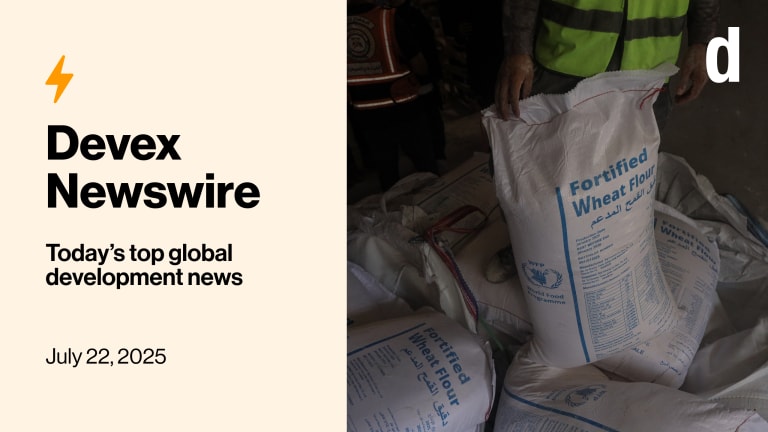
WASHINGTON — Senator Bob Corker, a top Republican lawmaker, told an audience in Washington, D.C., that it was a direct phone call he made to President Donald Trump that stopped the White House from issuing an executive order in June that would have placed additional restrictions on United States food aid programs. But he warned there is a good chance political supporters will try to enact further restrictions again.
While the U.S. is the largest provider of international food assistance — averaging approximately $2.4 billion a year — current shipping restrictions that require 50 percent of all U.S. food aid to be shipped on U.S.-flagged cargo vessels is costing at least $50 million annually. Most U.S. vessels charge higher rates and are also older, smaller, and slower than their foreign competitors. As a result 1.8 million fewer hungry people are fed than would be the case if shipping contracts were awarded on a competitive basis, according to a new report from the American Enterprise Institute.
Nongovernmental organizations and some members of Congress, including Corker, chairman of the Senate Foreign Relations Committee, have long advocated for reforming the way U.S. food assistance is procured and delivered, including abolishing the 50 percent shipping requirement known as the “cargo preference rule,” a contentious issue within the food aid reform debate.
Supporters say the rule protects U.S. jobs in the shipping industry and also that it is necessary to keep U.S.-flagged vessels running in case they are needed by the military in times of war.
However, critics point out that the bulk of food aid is currently being shipped on just four U.S.-flagged vessels, thus benefitting a small number of mariners, and that only one of those vessels is seaworthy enough for military use should the need arise. Removing the requirement would make food aid cheaper and more effective, they say.
Those critics have stepped up their efforts in recent months as Congress begins to consider the 2018 Farm Bill, which will set U.S. food and agriculture policy. They are hoping to build on modest gains made during the 2014 Farm Bill cycle towards relaxing food aid restrictions. They also point to the worst humanitarian crisis since 1945 and alarming statistics around global hunger; a recent report showed that global hunger and malnutrition are on the rise for the first time in a decade.
Speaking during an event on reforming international emergency food aid assistance organized by AEI on Thursday, Senator Corker told the audience that he had to “call the president directly” after hearing Trump planned to sign an executive order that would have increased cargo preference to up to 100 percent.
President Trump subsequently decided to drop the plan, Reuters reported.
Corker said that Trump “got it” and understood the case against upping cargo preference rates — but the senator from Tennessee said he expects further attempts to restrict the food aid system will be made by people with “nativist interests” inside the White House, including at the cabinet level.
“Unfortunately there are cabinet secretaries that represent the interests … [of] a small group of people … who might have supported the president,” he said, responding to a question from Devex, and added, “they are going to push this type of activity so … we’ve got to do everything we can to stop it raising its head again.”
A few hours after the AEI event, Corker chaired a Senate Foreign Relations Committee hearing about modernizing the Food for Peace program, during which he and a number of expert witnesses — including Chris Barrett, a professor at Cornell University; Bill O'Keefe, vice president for government relations and advocacy at Catholic Relief Services; and Thomas Melito, director of international affairs and trade at the U.S. Government Accountability Office — outlined the case for why cargo preference, and other restrictions on food aid, urgently need to be reformed.
Among other changes, experts said the government should end monetization — the practice of allowing NGOs in developing countries to sell U.S. food aid — which has been shown to disrupt local markets. Instead, the U.S. government could make more cash available to NGOs. The current requirements that all food aid be sourced from the U.S. — which supporters say is good for American farmers — can also lead to inefficiencies and delays in the delivery of much-needed food. Critics add that, since food aid accounts for just 0.1 percent of U.S. agriculture markets, changing the sourcing laws will likely have a negligible effect on farmers in the U.S.
According to Barrett, $350-$400 million a year is wasted on cargo preference,
monetization, and U.S.-sourcing requirements, and that by offering cash-based alternatives, the government could save an additional 40,000 to 45,000 children’s lives annually.
“Millions go hungry every year unnecessarily because of these … ridiculous requirements,” Corker said during the committee meeting.
Democratic Senator Chris Coons, who is also a member of the Foreign Relations Committee and a vocal critic of the current U.S. food aid system, said “we can and should find ways to remove some of these harmful restrictions and requirements, which I think are so inefficient.”
What's the future of U.S. aid and development policy under the Trump administration? Read Devex news and analysis and subscribe to The Development Newswire.
Read more Devex coverage:
► USAID chief outlines vision for agriculture, food security
► USAID exploring food aid, disaster assistance merger for Trump reorganization
► Mali shows impact of proposed cuts to US-funded school lunch programs
► Redesigning USAID's food aid bags could prevent 10,000 tons from going bad and save $15m a year








